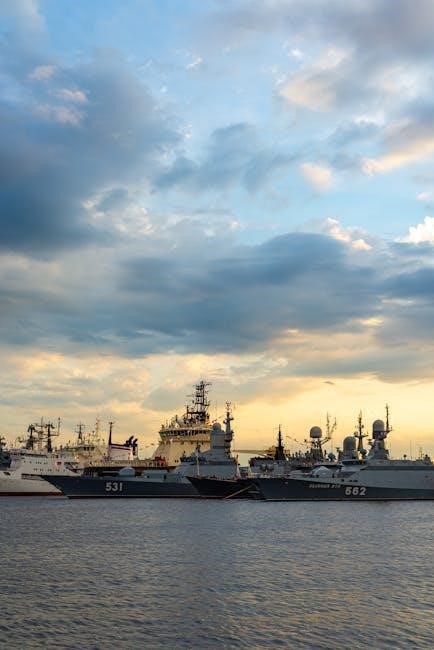Maritime English is vital for warship officers, ensuring clear communication, safety, and standardized protocols․ This guide provides essential language skills tailored for naval operations and effective command․
1․1 Importance of Maritime English in Naval Operations
Maritime English is critical for warship officers, ensuring clear, precise communication during naval operations․ It enhances safety, efficiency, and compliance with international standards like IMO SMCP․ Effective language skills prevent misunderstandings, vital in high-stakes environments․ Standardized phrases facilitate seamless coordination between multinational crews, improving response times in emergencies․ Proficiency in Maritime English also aids in navigating complex scenarios, such as maneuvering or emergencies, ensuring operational success and global cooperation․
1․2 Overview of the PDF Guide for Warship Officers
The PDF guide provides a comprehensive resource for warship officers, focusing on Maritime English․ It includes units on IMO Standard Marine Communication Phrases, grammar, and vocabulary․ Designed for deck officers and marine engineers, the guide covers general maritime terminology and specialized phrases․ Practical exercises and real-life scenarios enhance learning․ The PDF serves as a valuable tool for mastering communication skills, ensuring compliance with international standards and improving operational efficiency at sea․ It is tailored to meet the specific needs of naval personnel, fostering clear and effective communication․

Key Components of Maritime English for Warship Officers
Maritime English for warship officers includes standardized communication phrases, essential vocabulary, and terminology․ It ensures clear and effective dialogue, critical for safe and efficient naval operations․
2․1 IMO Standard Marine Communication Phrases (SMCP)
The IMO Standard Marine Communication Phrases (SMCP) are mandatory under SOLAS and essential for maritime operations․ They provide standardized language for clear and precise communication, reducing errors․ The SMCP covers both internal and external communications, ensuring safety and efficiency․ Officers must master these phrases for effective command and coordination․ The guide includes practical examples and exercises to reinforce learning, making it a critical tool for warship officers operating in high-stakes environments․
2․2 Essential Vocabulary for Naval Communication
Mastering essential vocabulary is critical for effective naval communication․ This section focuses on domain-specific terms, including nautical commands, ship operations, and safety protocols․ Officers must understand and apply standardized phrases for navigation, maneuvers, and emergency procedures․ The guide provides exercises and examples to reinforce learning, ensuring clear and precise communication․ This vocabulary is tailored to meet the unique demands of warship operations, enabling officers to perform their duties with confidence and accuracy․
Training and Development in Maritime English
Structured training programs and practical exercises enhance maritime communication skills․ Officers benefit from resources like PDF guides and real-life scenarios to master terminology and protocols effectively․
3․1 Structured Training Programs for Effective Communication
Structured training programs are essential for developing maritime English skills among warship officers․ These programs often include a 5-day intensive course focusing on grammar, vocabulary, and standard communication phrases․ Officers learn to apply IMO SMCP in real-life scenarios, ensuring clarity and precision in navigation and operations․ Practical exercises and simulations are integrated to enhance understanding․ Additionally, resources like PDF guides provide comprehensive materials, covering essential terminology and protocols․ Such structured approaches ensure officers are well-prepared for effective communication in high-stakes naval environments․
3․2 Role of Textbooks and PDF Resources in Learning
Textbooks and PDF resources play a crucial role in teaching maritime English to warship officers․ These materials provide structured lessons, covering essential vocabulary, IMO SMCP phrases, and practical scenarios․ Guides like “Maritime English for Deck Officers Vol․ I” offer tailored content, ensuring officers master communication skills․ PDF resources are easily accessible and often include exercises to reinforce learning․ They bridge the gap between theory and practical application, enabling officers to apply standardized language effectively in real-world naval operations․

Challenges in Mastering Maritime English
Mastering maritime English poses challenges, including cultural and linguistic barriers, rapid evolution of terminology, and the complexity of standardized communication for non-native speakers․
4․1 Cultural and Linguistic Barriers in Naval Communication
Cultural and linguistic barriers pose significant challenges in naval communication․ Officers from diverse backgrounds may interpret phrases differently, leading to misunderstandings․ Regional accents and dialects can also obscure clarity, especially in high-stress environments․ Additionally, language variations and idiomatic expressions may not translate well, complicating standardized protocols․ These barriers highlight the need for rigorous training in IMO SMCP and consistent language practices to ensure seamless communication and operational safety at sea․
4․2 Adapting to Modern Maritime Terminology
Adapting to modern maritime terminology is crucial for warship officers to maintain effective communication․ The constant evolution of technology and naval operations demands updated vocabulary and phrases․ Officers must stay informed about new terms related to ship systems, navigation tools, and safety protocols․ Resources like textbooks and PDF guides provide comprehensive updates, ensuring officers are proficient in current terminology․ Continuous learning is essential to bridge gaps between traditional and modern language, enhancing clarity and efficiency in critical situations at sea․
Case Studies and Practical Applications
Maritime English guides provide real-life scenarios and exercises, enabling officers to apply standardized communication in practical situations, enhancing their ability to handle diverse naval operations effectively․
5․1 Real-Life Scenarios for Using Maritime English
Maritime English is applied in real-life scenarios such as navigating through busy shipping lanes, coordinating search and rescue operations, and communicating during emergencies․ Officers use standardized phrases to ensure clarity, such as reporting positions, requesting assistance, or confirming instructions․ Practical exercises in guides like “Maritime English for Deck Officers” simulate these situations, helping officers master critical communication skills․ These scenarios emphasize the importance of precise language in high-stakes environments, ensuring safety and efficiency at sea․
5․2 Success Stories in Implementing Standardized Communication
Success stories highlight the effectiveness of standardized Maritime English in naval operations․ For instance, a 5-day training program improved communication skills among officers, reducing errors in critical situations․ Standardized phrases from IMO SMCP enhanced clarity during emergencies, ensuring swift and accurate responses․ Such implementations have led to safer navigation, efficient teamwork, and improved international collaboration․ These success stories underscore the value of standardized communication, encouraging wider adoption across the maritime industry to maintain operational excellence and safety at sea․

Future Trends in Maritime English Training
Digital tools and AI are revolutionizing Maritime English learning, offering personalized and interactive experiences․ Continuous professional development ensures officers stay proficient in evolving naval communication demands․
6․1 Integration of Digital Tools and AI in Language Learning
Digital tools and AI are transforming Maritime English training by offering interactive platforms for personalized learning․ AI-powered apps provide real-time feedback, improving pronunciation and grammar․ Simulated scenarios enhance practical skills, preparing officers for real-life communication challenges․ Adaptive learning systems tailor content to individual needs, accelerating mastery of naval terminology․ These innovations ensure officers achieve higher proficiency levels, enabling clearer and more efficient communication in high-stakes maritime environments․
6․2 Continuous Professional Development for Officers
Continuous professional development is crucial for warship officers to maintain and enhance their Maritime English skills․ Regular training ensures proficiency in standardized communication, adapting to evolving naval terminology, and staying updated with technological advancements․ Officers engage in workshops, online courses, and simulations to refine their language abilities․ This ongoing development fosters clear and precise communication, critical for safety and operational efficiency in high-pressure maritime environments․
Maritime English is essential for warship officers, ensuring safety, efficiency, and standardized communication․ This guide provides valuable resources and training, aiding officers in mastering naval terminology and protocols effectively․
7․1 Summary of Key Points
Maritime English is crucial for warship officers, ensuring clear communication and adherence to international standards․ Key points include mastering IMO SMCP phrases, understanding naval terminology, and leveraging structured training programs․ Effective communication enhances safety, efficiency, and collaboration among multinational crews․ Utilizing textbooks and PDF resources aids in consistent learning and application․ Real-life scenarios and success stories highlight the importance of standardized language in naval operations․ Continuous professional development and adaptation to modern terminology further strengthen operational excellence․
7․2 Final Recommendations for Mastering Maritime English
To master Maritime English, warship officers should consistently practice IMO SMCP phrases and stay updated on naval terminology․ Engage with structured training programs and utilize textbooks and PDF resources for comprehensive learning․ Collaborate with experienced officers to refine communication skills and participate in real-life scenarios to apply knowledge effectively․ Regular self-assessment and continuous professional development are essential for maintaining proficiency․ Adopting a lifelong learning approach ensures adaptability to evolving maritime standards and enhances operational excellence in global naval operations․
